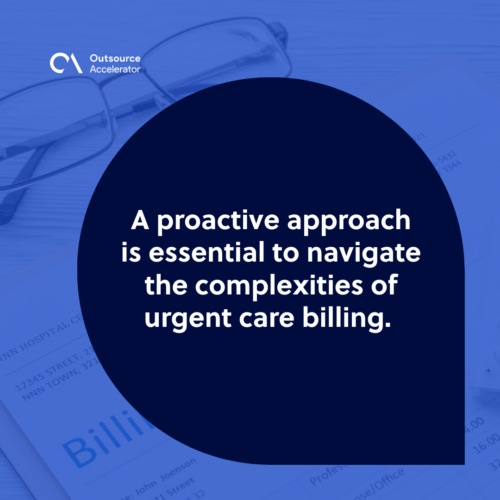Navigating the ins and outs of urgent care billing

The urgency of care delivery stems from the fundamental purpose of urgent care billing facilities— diagnosing and treating patients requiring immediate medical attention.
Individuals who often visit urgent care centers need relief from discomfort, pain, or minor medical issues that—while not life-threatening—necessitate timely intervention.
This sense of urgency on the part of patients propels healthcare providers to prioritize quick and efficient care delivery, ensuring that medical needs are met promptly.
However, as the medical staff focuses on providing immediate care, the billing process unfolds complexly. The perplexity of urgent care billing arises from aligning swift patient-centric care delivery with the intricate administrative processes required for proper billing.
This article discusses the multifaceted world of urgent care billing, exploring its key players, potential challenges, and strategies for establishing proactive billing procedures.
Defining urgent care billing
Urgent care billing represents a comprehensive system that governs the financial aspects of the healthcare process within urgent care centers.
It involves seamless financial transaction management in the healthcare sector and interactions involving patients, medical providers, and insurance companies.

This all-round process extends across a spectrum of activities, each playing a crucial role in ensuring the economic accuracy of the billing ecosystem within urgent care settings.
Here are the primary scope of services in urgent care billing:
- Minor injury treatment – Urgent care facilities provide medical care for non-life-threatening injuries, promptly addressing wounds, fractures, and sprains.
- Illness diagnosis and treatment – These facilities diagnose and treat minor illnesses, such as colds, flu, and infections, to alleviate symptoms and promote recovery.
- X-rays and diagnostic imaging – Urgent care clinics conduct radiographic examinations to visualize internal structures, aiding in diagnosing injuries and conditions.
- Lab testing – They perform medical tests on samples like blood, urine, or tissue to diagnose and monitor health conditions.
- Vaccinations and immunizations – Urgent care providers administer preventive vaccines to protect individuals from infectious diseases.
- Minor surgical procedures – They conduct minor surgical interventions to address medical issues, like suturing wounds or removing small growths.
- Prescription medication dispensing – Urgent carers provide prescribed medications to patients to treat their ailments or conditions.
Overview of urgent care billing process
The urgent care billing process navigates through several distinct stages as patients seek prompt attention for their healthcare needs. This is to streamline the financial aspects of their recovery journey.
Below are the steps in the urgent care billing process:
Patient check-in and registration
The patient check-in is the initial interaction between the patient and the billing cycle. This first step in the urgent care billing process is a vital link between your medical care and the financial side.
During this step, the urgent care staff warmly welcome patients as they arrive. The urgent care staff also gathers important information from the patients.
The medical biller will then use the details provided during patient check-in to create the records and ensure that the right services match the right payments.
Medical examination and treatment
The second step of the urgent care billing process is transitioning into the medical process. This stage revolves around the medical examination and treatment that skilled healthcare professionals provide.
The medical services rendered during this period encompass a wide spectrum. The given services may range from thorough examinations and diagnostic procedures to essential treatments and minor surgical interventions.
While the primary focus is delivering effective care, every facet of this phase is linked to the billing cycle.
Precise documentation of the billing process is essential for accurate billing and contributes to a comprehensive medical record that informs future care decisions.
Documentation of services provided
Within the urgent care billing process, the adage “if it’s not documented, it didn’t happen” holds particular weight. The meticulous documentation of every medical service rendered ensures transparency, accuracy, and compliance with industry standards.
In this phase, medical coders come into play, translating the nuanced medical procedures and interventions into standardized codes. These codes serve as the bridge between the medical domain and the intricacies of insurance reimbursement.
Submission of insurance claims
The convergence of urgent care billing in financial operations continues with the submission of insurance claims. This critical stage involves compiling comprehensive claims based on the documented medical services.
Claims must align meticulously with coding standards and insurance submission guidelines. The submission process initiates a dialogue with insurance companies, outlining the services provided and the associated costs.
The accuracy of these claims sets the tone for subsequent interactions and, ultimately, determines the speed and efficiency of reimbursement.

Adjudication and payment processing
Once the claims are submitted, insurance companies undertake the crucial adjudication process. The submitted claims are rigorously evaluated against coverage policies and medical necessity.
The insurance company’s assessment entails validating the claims and verifying their alignment with the patient’s coverage. Successful adjudication results in the approval of claims and paves the way for payment processing.
This final urgent care billing step involves the release of funds from the insurance company to the urgent care facility, an acknowledgment, and the recognized value.
Key players in urgent care billing
The effectiveness of urgent care billing relies on the collaboration of various stakeholders, each contributing to different aspects of the process.
Patients
Patients are not merely recipients of medical care; they also play a central role in initiating the billing cycle.
When patients provide crucial personal and insurance information, the entire billing process is built. Accurate personal details and up-to-date insurance information enable the urgent care center to initiate claims promptly.
However, patient engagement in the billing process extends beyond the check-in. Clear and effective communication between patients and healthcare providers is critical.
Patients who communicate their symptoms, concerns, and the services they receive contribute to accurate documentation and coding. It reduces the likelihood of claim denials or discrepancies.
Urgent care providers
In the urgent care billing process, medical practitioners’ responsibilities span the continuum of care, from medical examinations to treatments and procedures.
As these healthcare professionals tend to patients’ medical needs, they contribute to the billing cycle by meticulously documenting the care provided.
The success of insurance claims and subsequent reimbursement lies in the thoroughness and precision of the documentation by these frontline healthcare professionals.
Insurance companies
Insurance companies’ involvement in the urgent care billing process encompasses the evaluation, adjudication, and reimbursement stages.
When urgent care providers submit claims, insurance companies meticulously assess the claims’ validity, coverage, and reimbursement amounts. This ensures the claims adhere to insurance policies, regulations, and industry standards.
Adjudication, the process of determining the claims’ legitimacy, is a crucial phase where insurance companies determine how much they will cover the services rendered.
The outcome of adjudication profoundly impacts the financial outcome for patients and urgent care facilities.
Billing and coding specialists
The expertise of billing and coding specialists forms the backbone of the urgent care billing process. These professionals deeply understand medical terminology, procedural codes, and insurance guidelines.
The billing and coding specialists’ role bridges the gap between medical care and financial transactions, ensuring that insurance companies accurately translate and recognize services.
Additionally, the billing and coding specialists meticulously review the documentation of urgent care providers. Their proficiency in navigating the intricate coding process ensures the submitted claims comply with industry standards.
Potential challenges in urgent care billing
The journey through the urgent care billing landscape may not be without hurdles. Insurance claim denials can arise for various reasons, including coding errors, insufficient documentation, or discrepancies in coverage.
Here are two of the most common challenges in urgent care billing:
Insurance claim denials and appeals
One of the significant challenges within urgent care billing revolves around the potential for insurance claim denials.
These denials can stem from various reasons, including inaccuracies in documentation, errors in medical coding, or even limitations in coverage dictated by insurance policies.
How to address them
When insurance claims are denied, a dedicated process for handling denials and appeals enters the scene.
Urgent care facilities can challenge the denial through an appeals process. This involves the following procedure:
- Conducting meticulous review
- Gathering additional documentation
- Provisioning of clarifications to substantiate the validity of the claim
Handling claim denials and appeals underscores the necessity for thorough documentation, clear communication, and the commitment to securing the rightful reimbursement for the care provided.
Out-of-network services and associated costs
Patients seeking care at urgent care facilities outside their insurance network can face higher out-of-pocket expenses. This discrepancy in coverage can catch patients off guard, leading to potential misunderstandings and billing disputes.
How to address them
Urgent care representatives can explore various strategies to alleviate the financial burden on patients.
They can offer flexible payment plans tailored to patients’ financial capacities and help distribute the costs over a manageable timeframe.
Similarly, providing discounts or special arrangements for self-pay patients can foster understanding and cooperation between the facility and the patient.
Establish a proactive engagement for urgent care billing processes
A proactive approach is essential to navigate the complexities of urgent care billing. Urgent care facilities can proactively engage in urgent care billing processes by:

- Providing staff with comprehensive training on coding practices and insurance guidelines
- Implementing robust patient verification processes during patient check-ins
- Leveraging advanced billing software and electronic health record systems
- Openly communicating with patients about insurance coverage, potential out-of-network costs, and the billing process
- Regularly reviewing billing data, claim acceptance rates, and denial patterns
Urgent care providers must understand the key components of urgent care billing and addressing challenges head-on.
Doing so allows them and their patients to ensure that financial matters do not overshadow the critical goal of providing timely and quality medical care.







 Independent
Independent




